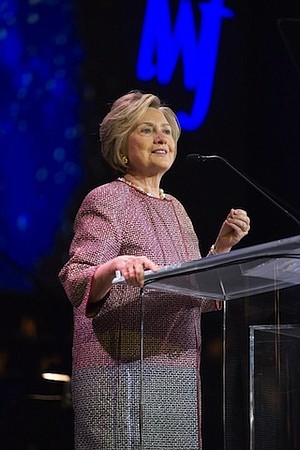10/17/2018

By Holly Thomas
(CNN) -- Since the explosion of #MeToo in October 2017, many of us have become jaded to the stock responses we can often expect from certain figures to stories of sexual harassment and abuse. At a rally in Pennsylvania last week, for example, President Trump once again mocked the movement, claiming he "wasn't allowed" to use certain expressions anymore, and laughing when a member of the crowd urged him to "do it anyway." It is galling in another way, however, to hear #MeToo undermined from an unexpected quarter -- as it was a few days ago by Trump's 2016 opponent, Hillary Clinton.
The former first lady, senator and secretary of state was asked during a CBS interview that aired on Sunday whether she felt that her husband, former President Bill Clinton, abused his power by having an affair with Monica Lewinsky while he was in office. Her response? Lewinsky "was an adult" when it happened. When asked whether her husband should have stepped down after the scandal and his resulting impeachment, she replied: "Absolutely not." Clinton followed her answer with a question: "But let me ask you this. Where's the investigation of the current incumbent, against whom numerous allegations have been made, and which he dismisses, denies, and ridicules?"
Monica Lewinsky was a 24-year-old White House intern at the time of her affair with President Clinton. He was 51. There are vital differences between behavior that constitutes sexual assault and actions that are abuses of power, of which having an affair with an intern many leagues your junior when you are the most powerful man in the world is obviously one.
But both merit examination. Clinton's protestation that Lewinsky was "an adult" undermines a core lesson of #MeToo: that abuse isn't necessarily contingent on age, gender, or fame, but is always contingent on power. Her resorting to "whataboutery" made it impossible to have a nuanced discussion about the particular abuse of privilege her husband was guilty of, and that many people who look up to her would have found relatable. It also squandered an opportunity to showcase an alternative mode of leadership, which considering her 2016 defeat and that year's victor, seems an especially unfortunate waste.
Clinton's call for an investigation of course referred to President Trump, and the numerous accusations of harassment and sexual assault that have been leveled at him since their race for office in 2016. Trump, too, has been in the press over the last few days commenting on similar themes, including at his infamous Mississippi rally earlier this month.
Addressing the local crowd, he mocked professor Christine Blasey Ford's testimony describing an alleged sexual assault at the hands of then-Supreme Court nominee Brett Kavanaugh (which he denied). Kavanaugh has since been sworn in. During his own interview with CBS, which also aired on Sunday, Trump doubled down on his offensive impression of Blasey Ford, declaring: "Had I not made that speech, we would not have won."
Trump's behavior is revolting, and must not be diminished in the context of substandard rhetoric from his former rival. But Hillary Clinton's failure to provide a superior example is disappointing for everyone who is still rooting for women to claim their power. Her defense of her husband's actions in retrospect -- and even after #MeToo -- sounds like what one might expect of a former first lady, not of a political contender in her own right. Her decision to back her husband over Lewinsky rang similar to Trump's wife Melania, who recently stressed that victims of sexual assault need to show "really hard evidence."
Tellingly, Democratic Sen. Kirsten Gillibrand, who holds Hillary Clinton's former seat in New York, said last year that stepping down would have been "an entirely appropriate response" for President Clinton after the Lewinsky scandal. She added: "We should have a very different conversation about President Trump, and a very different conversation about allegations against him."
There must be few people on whom missed opportunities weigh more heavily than Hillary Clinton. In losing the presidential race she rewrote the first line of her obituary and sealed herself in the public consciousness as the woman who fell (or was pushed) at the final hurdle -- emblematic of the past, rather than a figurehead for change. It feels strange, when she must be so sensitive to the public mood and likely response, to watch her repeat what feel like stale mistakes.
After she lost the presidential race in 2016, she said: "To all the little girls watching ... never doubt that you are valuable and powerful and deserving of every chance and opportunity in the world." Her CBS interview suggested uncomfortable exceptions to that rule, when the right man's narrative is threatened. Meanwhile, Trump continues to make a direct mockery of women's pain, and glibly brushes off accusations against himself. In different ways, both negate the most significant social movement of the last two years.
The midterm elections are weeks away. It will be the first time voters can weigh in on a national level about the impact of the 2016 election, and everything since. It is clear that any positive development will depend on fresh blood at the helm for both parties. If anything is to be learned from Trump's election, it is that America is receptive to, and hungry for, change. If anything is to be learned from Hillary Clinton's defeat, it is that there is no point in defending a tired status quo, which defends inherited privilege. It seems she is yet to fully appreciate that lesson. Let us hope that Democrats at large have, and that they will secure a more forward-thinking candidate for their 2020 challenge.
